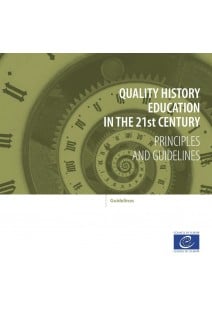



History education has an important role to play in confronting the current political, cultural and social challenges facing Europe; in particular, those posed by the increasingly diverse nature of societies, the integration of migrants and refugees into Europe, and by attacks on democracy and democratic values. The overall aim of these Principles and guidelines, therefore, is to enhance the expertise and capability needed if history education is to play that role successfully. They build on the Council of Europe’s vision of history teaching as reflected in a number of key documents of the Committee of Ministers and the Parliamentary Assembly.
INTRODUCTION
INCLUDING THE COMPETENCES FOR DEMOCRATIC CULTURE
IMPLICATIONS FOR ASSESSMENT
IMPLICATIONS FOR TEACHER EDUCATION AND CONTINUING PROFESSIONAL DEVELOPMENT
PRINCIPLES AND GUIDELINES FOR ESTABLISHING DEMOCRATIC, DIVERSE AND INCLUSIVE HISTORY CURRICULA AND PEDAGOGY
1. Developing flexible curricula and interactive pedagogies which acknowledge cultural differences
2. Teaching and learning about the complex history of democracy
3. Reflecting the ways in which the activities of ordinary individuals and groups of people have shaped the history of societies
4. Recognising that people of different cultural, religious and ethnic backgrounds have often been long established in societies
5. Valuing the multiple identities of both ‘the other’ and ourselves
6. Providing the tools for evaluating historical sources and combatting manipulative propaganda
7. Addressing issues that might be sensitive or controversial
8. Balancing the cognitive, the emotive and the ethical dimensions in history teaching and learning
OVERVIEW OF THE PROJECT

History education has an important role to play in confronting the current political, cultural and social challenges facing Europe; in particular, those posed by the increasingly diverse nature of societies, the integration of migrants and refugees into Europe, and by attacks on democracy and democratic values. The overall aim of these Principles and guidelines, therefore, is to enhance the expertise and capability needed if history education is to play that role successfully. They build on the Council of Europe’s vision of history teaching as reflected in a number of key documents of the Committee of Ministers and the Parliamentary Assembly.
